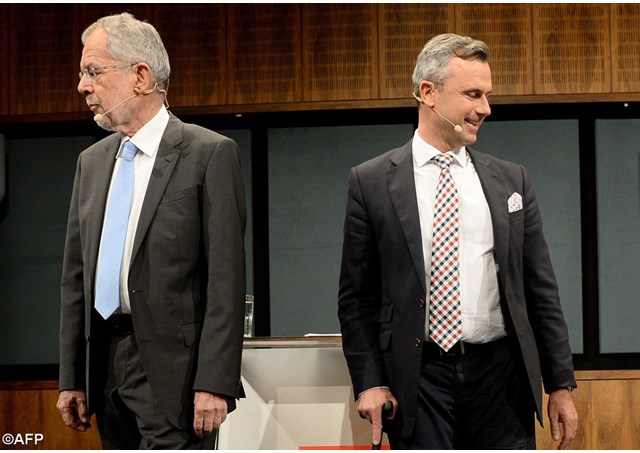
Austria's Controversial Presidential Poll Overshadowed By Deadly Shooting

(Vatican Radio) Austrian police say a gunman fired shots early Sunday into a crowd
attending an open air concert east of Austria's
border with Liechtenstein, killing two people and wounding 11 others. The deadly incident
came shortly before polls opened in a
presidential election, that could produce Austria's first far-right head-of-state
since World War II.
Listen to Stefan Bos' report
![]()
The overnight concert, organized by a local motorcycle club in the Austrian town of
Nenzing in Vorarlberg province, ended in drama, witnesses said.
Panic reportedly broke out as shots rang out, with many in the crowd running into
nearby woods or onto a freeway near the venue, explained
Florian Kasseroler, mayor of Nenzing.
Police spokeswoman Susanne Dilp said the shooting was preceded by a loud argument
between the 27-year-old gunman and a woman in
a nearby parking lot. "This argument must have escalated. The man then grabbed a gun
from his car, went to the concert venue, and
started shooting around wildly," she told reporters.
Police said the weapon was a rifle or similar long gun and that the man killed himself
after returning to the parking lot.
The deadly incident came just hours before voting got underway Sunday in a contest
between Norbert Hofer of the right-wing
Eurosceptic Freedom Party and Greens Party politician Alexander Van der Bellen for
the presidency.
EU WORRIED
Concerns remain within the European Union that Hofer may become Austria's first far-right
president since the Second World War.
His popularity has been linked to worries in Austria about the influx of people fleeing
war and poverty.
Yet at a final rally, Hofer defended his anti-Muslim overtones and warned the EU he
would not accept Turkey's membership. "If it becomes true that the European Union
accepts Turkey as a member state, then Austria has nothing to do with the European
Union anymore," he said.
"We don't accept orders from Brussels nor Berlin. We respect Brussels and Berlin but
the decision who becomes the president or chancellor
is up to the elective people in Austria," Hofer added.
That's in direct contrast to rival Van der Bellen who says he is is for "an open,
Europe-friendly, Europe-conscious Austria."
And as he cast his ballot, Van der Bellen remained hopeful he would receive most votes.
"I am fairly optimistic. But we will only
in the evening and perhaps Monday evening because of additional ballots that have
to be counted. But I am fairly optimistic," Van der Bellen
told journalists.
Analysts say international controversy isn't new for the alpine nation: Austria's
President Kurt Waldheim, who was backed by the centrist People's Party,
faced international isolation decades ago after revelations that he served in a German
unit linked to atrocities in World War II.
| All the contents on this site are copyrighted ©. |


